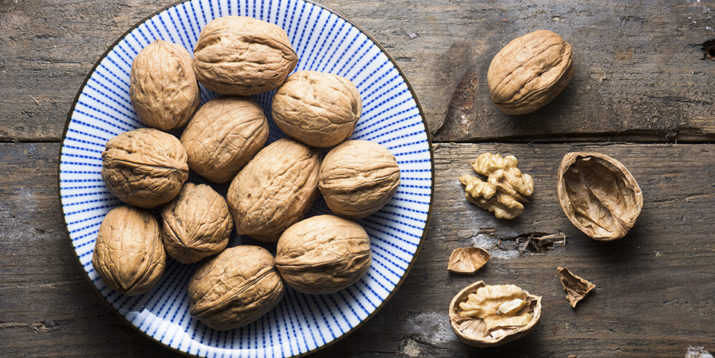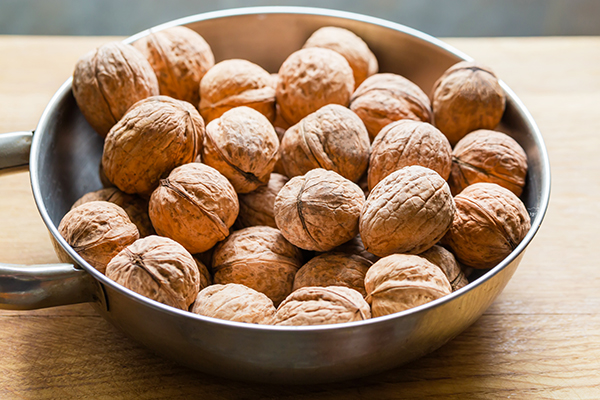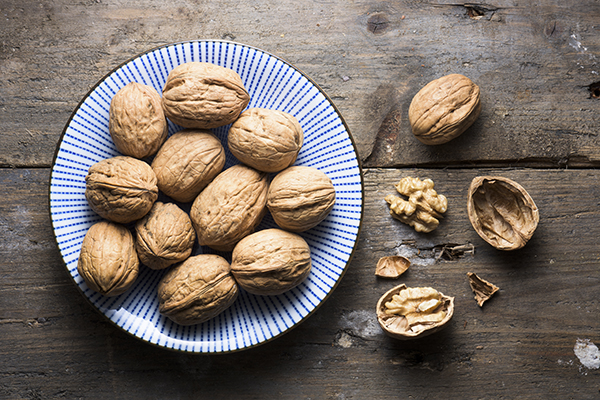Wild About Walnuts? Get the Facts About Your Favorite Nut

Walnuts can be a tricky food — they are tasty and healthy, but also calorically dense. Read on to learn all about walnuts nutrition, potential benefits, and how to incorporate them into your healthy eating plan.
Walnut Nutrition Facts
“Walnuts are calorically dense,” says Quyen Vu, M.S., R.D. “So you don’t want to overeat them. However, they can still be included in a diet plan for weight loss.”
Vu recommends adding them to a smoothie if you don’t love the taste of them plain — like with this Blackberry Walnut Chocolate Shakeology — or buying them raw and unsalted, and adding your favorite spices.
Overall, walnuts contain iron, magnesium, and phosphorus, as well as healthy fats and protein.
Here’s a breakdown of walnuts’ nutrition information.

Nutritional Value of Walnuts
Raw Walnuts, 1 ounce, about 14 halves
| Calories | 185 |
| Protein | 4.31 g |
| Fat | 18.5 g |
| Carbohydrates | 3.88 g |
| Fiber | 1.9 g |
| Calcium | 27.8 mg |
| Iron, Fe | .825 mg |
| Magnesium | 44.8 mg |
| Phosphorus | 98.1 mg |
| Copper | 0.451 mg |
Now that we’ve reviewed walnut nutrition information, it’s easy to overdo it with these calorie-dense nuts, but adding some into your diet every day will help you reap the benefits.
As Vu says, eating walnuts every day depends on your nutrition goals and what other fat sources you’ve had for the day.
“In general, eat no more than one to two tablespoons per meal,” she says. “Keep in mind that unsalted is best if you’re trying to watch your sodium content per day, as the salted versions will also contribute to your overall sodium intake.”
Try adding a few walnuts to a dish with less fat, like this Grilled Romaine and Walnut salad.
1. Walnuts contain “good” fat and Omega-3 fatty acids

Even though walnuts are high in fat, they are high in the good kind of fat — polyunsaturated fatty acids.
According to a study on the effect of walnuts on blood lipids and heart health, a diet with walnuts can lower total cholesterol and LDL cholesterol, the “bad” cholesterol, which can raise your risk of stroke.
Walnuts are also high in α-linolenic acid, an omega-3 fatty acid that may provide health benefits.
2. Walnuts contain antioxidant-like compounds
According to a 2020 study, walnuts contain antioxidant properties, which may help lessen the adverse effects associated with aging.
Walnuts are often referred to as brain food because they have been shown to potentially provide cognitive benefits in older adults, making them a great addition to just about any diet, says Heather Hanks, a medical advisor and nutritionist.
Hanks likes to wrap a walnut in a Medjool date for a delicious snack or roll a homemade energy ball in chopped walnuts for a crunchy treat.
If you are looking to increase your greens, toss a few into a Strawberry and Spinach Salad for added crunch.
3. Walnuts contain minerals
Copper, something that your body can’t make itself but does need, is found in walnuts.
When you take in copper, it works with iron to keep your blood cells and vessels healthy and aids in iron absorption for happy bones.
4. Walnuts help promote satiety

If these other potential benefits of walnut nutrition sound appealing, here’s one you can notice every day.
Do you find yourself fading just before lunch or hitting a 3 p.m. slump?
Great news: according to a small study, walnuts can help you feel full.
So sprinkle some on your morning yogurt parfait, or opt for a handful of walnuts over the ultra-processed snacks in the office vending machine.
Here are some more recipes with recipes to try:
Strawberry Walnut and Oats Shakeology
No-Bake Apple Blondies With Walnuts
Baked Oatmeal Cups With Raisins and Walnuts
Looking for more expert nutrition information? Head over to BODNutrition.com and learn how to eat healthy for the long-term with the help of our two nutrition programs, 2B Mindset and Portion Fix.
